

 I. National Digital Education Architecture (NDEAR)
I. National Digital Education Architecture (NDEAR)Architecture with a vision to create “Unifying national digital infrastructure to energise and catalyse the education ecosystem”. Essentially, this is a technological framework that aims to enable existing systems to upgrade and become interoperable, while making available, the building blocks for the creation of new tools and solutions. NDEAR aims to energise and catalyse the digital education ecosystem to create and deliver diverse, relevant, contextual, innovative solutions that benefit students, teachers, parents, communities, administrators resulting in timely implementation of policy goals.
Know More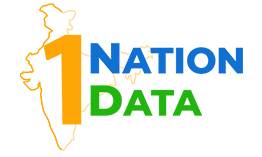 II. One Nation One Data
II. One Nation One DataONOD Initiative represents the underlying initiative in easing data discovery process for education and skilling delivery institutions. The ONOD Portal shall serve as the access point for unified education data architecture assimilating AICTE, NBA, NAAC, NIRF, and School databases etc. This shall aid in accessing real-time credible data on the status of educational institutes preventing fraudulent practices. The portal shall also share required user-consented information to different agencies/entities by utilizing 2-way Open APIs. The technology enabled-path would make the assessment and accreditation processes sound and reliable while eliminating redundancy.
Know More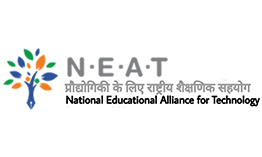 III. NEAT Portal
III. NEAT PortalNational Educational Alliance for Technology (NEAT) is an initiative comprising of an umbrella of activities aimed at bringing EdTech companies’ products of online learning content and courses to students/youth of the country for enhancing their employability skills and prospective students onto the same platform. The ultimate aim of NEAT is to bridge student learning gaps and providing personalized learning experiences. NEAT has been providing free course coupons / seats (25% of the sale) to students of economically and socially weaker sections of society. NEAT is also promoting Indian EdTech Companies with the mission of “Aatmanirbhar Bharat” and playing an enabling role for enhancing collaboration between EdTech Companies and Academic Institutions in order to bridge the gap between academic learning, upskilling initiatives and industry needs. The latest NEAT evaluation has geared its focus on vocational skilling, upskilling and reskilling in emerging technologies such as AI/ML & Domains of national importance such as Quantum Computing, 5G and semiconductor technologies.
Know More IV. Student and Teacher Registry
IV. Student and Teacher RegistryThe Education Ecosystem Registry (EER) initiative shall enable a decentralized, comprehensive federated registry of all education and skilling related data using Unique Student ID (based on Aadhaar) as the federated and verifiable identity of the user; and further developing EER Open APIs that establish data sharing linkages between previously standalone education and skilling platforms and databases. EER shall enable federated, de-centralized hosting of student and teacher registry with common minimum data fields shared through EER 2 way Open APIs, with other compatible, interoperable & standardized registries; with due user consent for data sharing in adherence to InDEA2.0 & NDEAR architecture.
EER Open APIs shall uniquely identify and transmit student data amongst federated registries using unique Student ID, Aadhaar enabled SSO User Authentication and Digilocker (NAD + ABC) API Integration. When a student moving from one organization from other, basic information of student will get transferred. Vidya Samiksha Kendra (VSK) anonymized data stream through EER APIs shall be done to enable high level analytics, dashboard reporting to support policy decision making.
Know More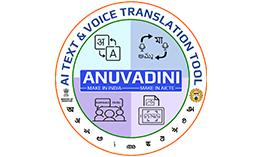 V. Anuvadini (AI Text & Voice Translation Tool)
V. Anuvadini (AI Text & Voice Translation Tool)India has a rich & diverse lingual demographic, with 80% of the population identifying themselves as Non-English, Native Language speakers. A significant outcome of this regional diversity is the challenge in delivering standardized and high quality educational content in a manner that is comprehensible to students with diverse regional languages being spoken. Further, there are multiple higher education hotspots in the country such as Central Universities, IITs, and NITs etc. These institutions groom students coming from rich diverse cultural backgrounds; existing barriers to communication owing to distinct languages spoken eventually constrains the extent of collaboration and innovation that students can be capable of. Similarly scope for cross country collaboration in research is constrained due to language.
In this regard, having support for 22 regional Indian & foreign languages, ANUVADINI - AICTE Text & Voice Translation Tool can help break language barriers & unify India and the World under the principles of Ek Bharat Shrestha Bharat and One Earth, One Family, One Future!
Core Functionalities of Anuvadini are numerous with a plethora of potential use cases. The main functionalities are: - Text to Text Translation, Speech to Speech Translation, Video Translation, Multilingual Forms with Voice Capability, Chat GPT Integration, Multilingual Online Tutorials Module. The AICTE Speech Messenger can help allow students to comfortably communicate in their preferred language while ensuring seamless and effective communication. This retains and celebrates the country’s diversity in language while ensuring that students can communicate easily during their academic journeys. The Speech Messenger allows multiple use cases wherein universities across the country may have chat groups dedicated to specific disciplines or research fields which promises to fillip sharing of ideas, debate, collaboration and innovation.
Know More VI. Document Translation Tool
VI. Document Translation ToolAICTE Document Translation Tool has already exhibited its usefulness and unmatched ability to preserve look & feel and formatting of textbook while accurately translate only textual content while preserving a document’s structure with tables, photos, diagrams etc. This has allowed students from across the country to access educational content and coursework of their choice in the regional language of their preference and helped regional academic institutions to deliver UG and Diploma courses in regional languages.
Know More VII. Digital University
VII. Digital UniversityThe Digital University Initiative seeks to implement NEP vision of internationalization and will provide access to students across the country for world-class quality universal education with personalized learning experience at their doorsteps. This will be made available in different Indian languages and ICT formats. The University will be built on a networked hub-spoke model, with the hub building cutting edge ICT expertise. The best public universities and institutions in the country will collaborate as a network of hub-spokes.
Know More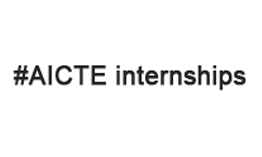 VIII. National Internship Portal
VIII. National Internship PortalThe AICTE National Internship Portal serves as a marketplace for bringing valuable, industry linked, paid, fulltime or part time internship opportunities to more than 1.7 Crore students across the country with valuable professional experience and internship completion certificates. The portal is a one stop solution for internship opportunities in the Government sector like MoHUA, NHAI, Railways, MoSJE as well as MSMEs, Corporates Sector, NGOs, Start-ups, and Research organizations. It is envisioned to reach a target of 1 crore internships by 2025.
Know More IX. National Apprenticeship Training Scheme 2.0 Portal
IX. National Apprenticeship Training Scheme 2.0 PortalThe National Apprenticeship Training Scheme (NATS) is a flagship programme for skilling Indian youth and is designed to equip technically qualified youth with hands on, industry related, practical knowledge and skills by bringing together Industry, Educational Institutions and Students. The NATS Portal has been developed by AICTE for the Ministry of Education and has over 9,000 industry active establishments; 11,000 active educational institutions and around 6,00,000 students registered till date.
Know More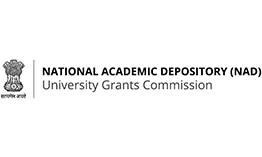 X. National Academic Depository
X. National Academic DepositoryThe National Academic Depository aims at ensuring a credible and convenient mechanism for online lodging, verification and authentication of the academic awards issued by various educational institutions. Maintaining academic awards in an electronic depository would provide benefit to educational institutions, students and employers by enabling online access of academic awards which will eliminate the need for persons to approach educational institutions for obtaining transcripts of such awards or marks-sheets for verification. It also seeks to eliminate fraudulent practices such as forging of certificates and mark-sheets, by facilitating online verifications thereof.
Know More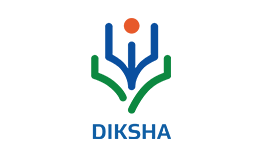 XI. DIKSHA (Digital Infrastructure for Knowledge Sharing)
XI. DIKSHA (Digital Infrastructure for Knowledge Sharing) DIKSHA (Digital Infrastructure for Knowledge Sharing) is a national platform for school education, an initiative of NCERT, under the aegis of the MoE
Know More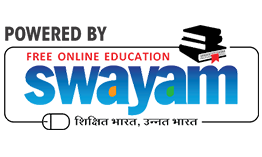 XII. SWAYAM Portal
XII. SWAYAM Portal SWAYAM is a programme initiated by Government of India and designed to achieve the three cardinal principles of Education Policy viz., access, equity and quality. The objective of this effort is to take the best teaching learning resources to all, including the most disadvantaged. SWAYAM seeks to bridge the digital divide for students who have hitherto remained untouched by the digital revolution and have not been able to join the mainstream of the knowledge economy. Swayam is a platform that facilitates hosting of all the courses, taught in classrooms from Class 9 till post-graduation to be accessed by anyone, anywhere at any time. All the courses are interactive, prepared by the best teachers in the country and are available, free of cost to any learner. About 100,000 students have already enrolled in this facility (by March 2022).
The courses hosted on SWAYAM are in 4 quadrants –
(1) video lecture,
(2) specially prepared reading material that can be downloaded/printed
(3) self-assessment tests through tests and quizzes and
(4) an online discussion forum for clearing the doubts. Steps have been taken to enrich the learning experience by using audio-video and multimedia and state of the art pedagogy / technology.
The national coordinators of SWAYAM are AICTE, CEC, NCERT, IGNOU, NIOS, NITTR, IIMB, NPTEL, UGC.
Know More